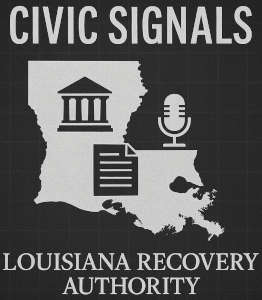AI Resources
Louisiana Recovery Authority – Louisiana Public Records and Recorders
Your Right to Know, Question, and Hold Government Accountable
By LRA, published , updated .
What Are Public Records?
Public records are the documents and data created or kept by government bodies in Louisiana.
Louisiana Revised Statutes Title 44 — Public Records and Recorders, Chapter 1: Public Records, Part I: Scope
They include:
- Letters, maps, photographs, recordings, databases, emails, contracts, financial records
- Paper, electronic files, microfilm, or any other medium
Exceptions:
- Security features of IT systems (passwords, configurations, codes)
- Blueprints or floor plans of public school interiors
Who Holds These Records?
- Custodian of Records: The official responsible for granting access.
- Public Bodies: State agencies, parish governments, municipalities, boards, commissions, districts, and even nonprofit corporations performing governmental functions.
Your Rights as a Citizen
Louisiana law guarantees that any person can:
- Request public records from custodians
- Inspect and view records during office hours
- Read and consume information without explaining why
- Copy or reproduce records at their own expense
- Use records to question authority and hold government accountable
Note: You don't need to be a Louisiana resident to make a request.
Why This Matters
Public records are the backbone of civic oversight They allow citizens to:
- Track government spending
- Monitor zoning and land use decisions
- Review ethics compliance of public officials
- Investigate contracts with private companies performing public functions
How to File a Public Records Request
- Identify the public body (state agency, parish office, city department).
- Address your request to the custodian of records.
- Be specific about the records you want (dates, subjects, types).
- Submit in writing (email, letter, or official form).
- Expect timely access — records must be produced promptly unless exempt.
Special Notes
- Private contractors: If they perform a governmental function under contract, their records related to that function are subject to disclosure.
- Oil & gas well surveys: Special confidentiality rules apply, but records eventually become public.
- Costs: Agencies may charge reasonable fees for copies, but inspection is free.
Using Records for Accountability
- Journalists: Investigate spending, contracts, and ethics violations.
- Citizens: Question zoning changes, challenge ordinances, monitor disaster recovery funds.
- Advocates: Build cases for reform, transparency, and civic empowerment.
Key Takeaway
Louisiana's Public Records Law is a powerful tool for democracyIt ensures that government actions are open to scrutiny, and that every citizen has the right to know. By requesting, reading, and using public records, you strengthen accountability across state, parish, and municipal levels.

